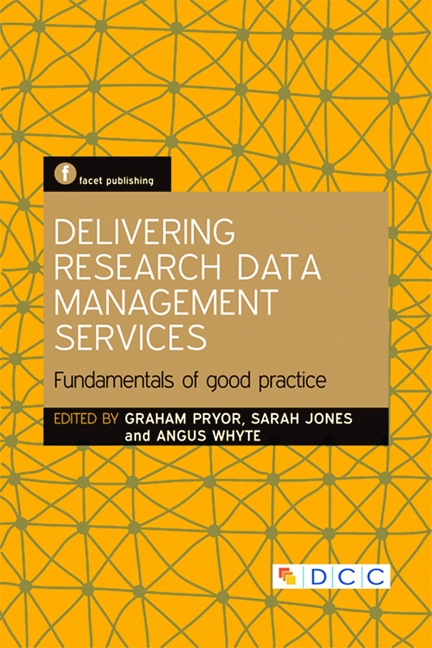Book contents
- Frontmatter
- Contents
- Preface
- Contributors
- 1 A patchwork of change
- 2 Options and approaches to RDM service provision
- 3 Who's doing data? A spectrum of roles, responsibilities and competences
- 4 A pathway to sustainable research data services: from scoping to sustainability
- 5 The range and components of RDM infrastructure and services
- 6 Case study 1: Johns Hopkins University Data Management Services
- 7 Case study 2: University of Southampton – a partnership approach to research data management
- 8 Case study 3: Monash University, a strategic approach
- 9 Case study 4: a national solution – the UK Data Service
- 10 Case study 5: development of institutional RDM services by projects in the Jisc Managing Research Data programmes
- Index
9 - Case study 4: a national solution – the UK Data Service
Published online by Cambridge University Press: 08 June 2018
- Frontmatter
- Contents
- Preface
- Contributors
- 1 A patchwork of change
- 2 Options and approaches to RDM service provision
- 3 Who's doing data? A spectrum of roles, responsibilities and competences
- 4 A pathway to sustainable research data services: from scoping to sustainability
- 5 The range and components of RDM infrastructure and services
- 6 Case study 1: Johns Hopkins University Data Management Services
- 7 Case study 2: University of Southampton – a partnership approach to research data management
- 8 Case study 3: Monash University, a strategic approach
- 9 Case study 4: a national solution – the UK Data Service
- 10 Case study 5: development of institutional RDM services by projects in the Jisc Managing Research Data programmes
- Index
Summary
Introduction
Data management has been succinctly defined by the editor of this volume in an earlier work as ‘an active process by which digital resources remain discoverable, accessible and intelligible over the longer term’ (Pryor, 2012, vii). Research Data Management (RDM) to the present authors is a subtly different process, which can be seen as the activities that are undertaken by a researcher or team of researchers as part of the research lifecycle, which precede but complement the activities of a data service or data service infrastructure. Theoretically, the breakpoint between the responsibilities of the two streams of activities is the transfer of data from the data producer to the host repository but in practice this is not so black and white. In this case study we outline the key activities and services carried out by the UK Data Service that support research data management as they relate to the production of research data in the social sciences. We explain how our services, together with those delivered by other providers, can contribute to the muchneeded wider portfolio of training and professionalization in RDM in the higher education sector.
The UK Data Service began its new life in 2012 as an integrated service funded by the Economic and Social Research Council (ESRC). Aiming to create a more unified service and identity for the ESRC's data services in the UK, it consolidates the former Economic and Social Data Service (ESDS), the Secure Data Service (SDS) and much of the data service component of the ESRC's Census Programme. The primary aim of the service is to provide users with access to easily discoverable and relevant data to enable and expand social and economic research. However, there are subsidiary aims which stem from this primary aim, and one of those is to inculcate better research data management practices amongst researchers and data creators. The service is run from the UK Data Archive at the University of Essex in strong collaboration with a number of significant partners, including Mimas and the Cathie Marsh Centre for Census and Social Research at the University of Manchester, along with the Geography Department at the University of Southampton.
- Type
- Chapter
- Information
- Delivering Research Data Management ServicesFundamentals of Good Practice, pp. 191 - 204Publisher: FacetPrint publication year: 2013



